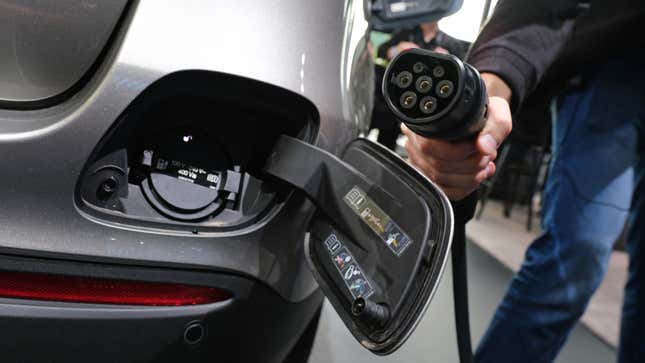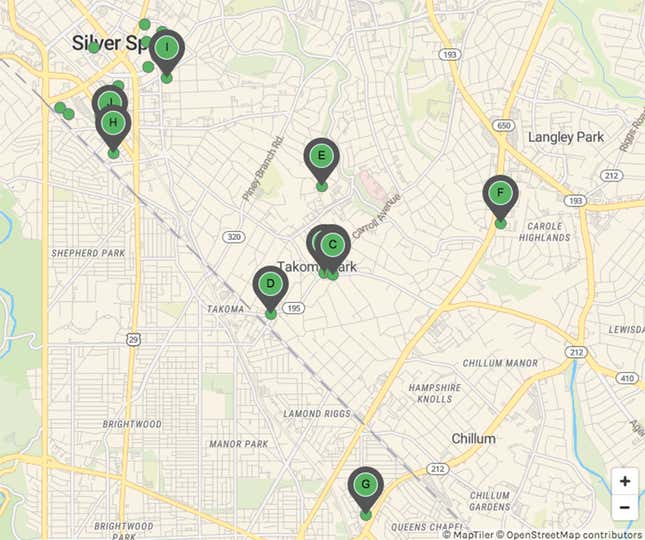
Part of what makes electric car ownership difficult is the lack of available charging infrastructure away from the home. People can feel trapped by an EV’s range if their destination isn’t close to a charging station. Overall, we need to grow the charging infrastructure, and one Maryland gas station owner is helping the cause by converting his business into a charging station.
About a month ago, RS Automotive opened in Takoma Park, Maryland, as the first U.S. gas station that’s been converted fully to an EV charging station, reports NPR. Its owner, Depeswar Doley, has kept the station looking largely the same as a regular gas station, so sometimes there’s confusion from drivers who pull up with their internal combustion engine cars, looking to fill up.
“A lot of them pull up and get upset,” Doley tells the outlet. There have been about eight to 12 customers charging their cars per day over the course of the past week, but there appears to be healthy interest.
The number of EVs on the road is growing, helped along with the increasing availability of more affordable models. More and more people are buying them, and more and more people are considering the switch. What’s holding many back is the lack of charging stations everywhere and how long it takes the battery to charge. Doley’s station solves at least one of those problems. His station adds to the number of available chargers in his area.
Here’s a map of available chargers in the Takoma Park. There are some, but they aren’t super numerous.

RS Automotive started as a typical gas station and repair shop, but didn’t have the best of luck, according to NPR. Doley’s owned it since 1997, but after two decades of fluctuating oil prices, bad contracts and break-ins at the convenience store, he was fed up. Taking out a personal loan, Doley pulled the underground storage tanks and planned to just operate the repair shop alone.
Then:
Doley got a call from the city: Would he want to transform the station into a fully outfitted charging center? The offer came with a $786,000 grant to pay for the conversion — a combination of state funding and money from the Baltimore-based Electric Vehicle Institute.
Sixty-six percent of the charging revenue goes to Doley, while EVI gets 33 percent. Prices start at a base of $2.50, plus an extra $0.20 per minute. Doley keeps the power going, while EVI maintains the chargers.
Dan Bowermaster from the Electric Power Research Institute tells NPR, “There’s definitely a very real need to to have these DC fast-charging centers whether it’s for [low-income], for lower-income customers, or for fleets or for those who live in a townhouse, where they just simply don’t have a garage with 120-volt or 240-volt outlets.”
Currently, the majority of Doley’s customers are police cars and electric taxis. But he is willing to wait for the EV life to catch on with more of the public. NPR estimates a customer’s average charging time to take around 15 to 30 minutes, so the convenience store has been converted into a charging lounge with comfy chairs and WiFi. It doesn’t sell food, which is apparently to encourage people to walk around the neighborhood while charging their cars.
It’s worth pointing out that most EV owners still charge their cars at home, and even 15 minutes is seen as a long time to sit and wait at a station. And yes, if someone gave me nearly a million bucks to turn my gas station into an EV charging station, I’d probably do it, too.
And sure, having the station look like a traditional gas station can cause unnecessary confusion. But if we’re going to be serious about converting people to EVs, the more we rely on systems they already know and understand the better. We don’t have to teach them what car chargers look like because they’ll just look like regular fill-up stations. The idea remains the same.
Let’s face it. Most of the EV resistance is coming from fear of not being able to take a long road trip, even though most of these road trips only happen once or twice a year. Stations like these help alleviate that worry when you do take the trip. And with more and more of them around, people will feel empowered to go further.
Even if Doley’s station winds up failing, it’s still a good thing that it happened at all. We need more charging stations in general, and the more there are, the more awareness spreads.
Definitely head over to NPR to check out the full story and see photos of Doley’s station.